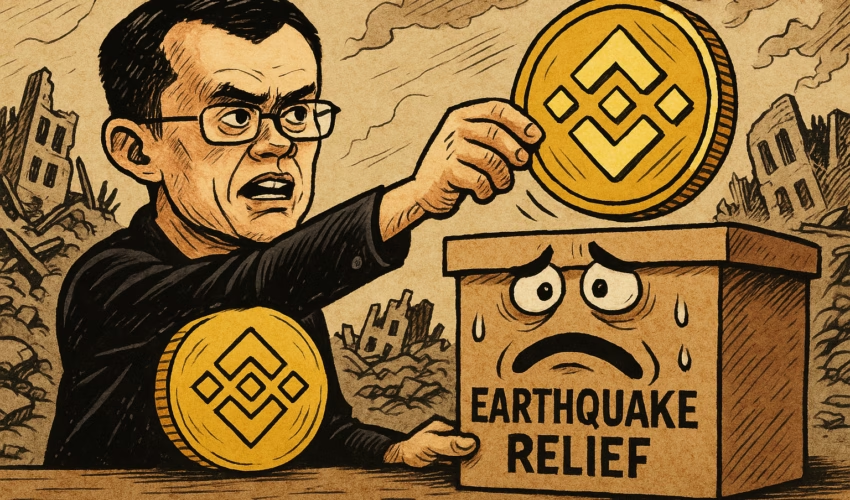500 BNB pledged to each country as crypto donations once again emerge as a tool for disaster response
Overview
Changpeng Zhao(CZ), co-founder and former CEO of Binance, has pledged 500 BNB (approximately $610 per token at press time) to support disaster relief efforts in Thailand and Myanmar following a devastating 7.7 magnitude earthquake that struck the region on March 28.
The earthquake, which originated near Mandalay, Myanmar’s second-largest city, has resulted in at least 144 confirmed fatalities and over 700 injuries, according to The Guardian. Widespread structural damage and flooding have compounded rescue challenges, with both governments calling for international assistance.
Zhao’s announcement came via a post on X (formerly Twitter), where he wrote:
I will donate 500 BNB each to Myanmar and Thailand.
Is there a transparent on-chain donation system with DID? If not, I will rely on @Binance and @Binance_TH_ to distribute.
— CZ 🔶 BNB (@cz_binance) March 28, 2025
“I hope everyone is safe in Thailand,” before confirming his donation to both affected countries.
Distribution Plans and Platform Support
CZ said that the donation will be facilitated through Binance and its local partner Binance Thailand. If no suitable third-party onchain donation platform is identified, the funds will be distributed directly through these Binance entities to ensure timely delivery of relief aid.
While the structure and recipients of the funds are still being finalized, the donation aligns with a broader trend of utilizing blockchain-based infrastructure for cross-border humanitarian aid.
Crypto as a Disaster Relief Tool
This is not the first time cryptocurrency has played a role in responding to natural disasters. The unique attributes of blockchain — including instant settlement, low fees, and global accessibility — make crypto a practical medium for rapid-response donations.
-
In February 2023, crypto donations surged following the 7.8 magnitude earthquake in Turkey and Syria, with prominent figures like Haluk Levent helping to coordinate digital asset-based aid.
-
The Giving Block, a crypto philanthropy platform, raised over $1 million to support recovery from the 2023 Maui wildfires and launched a similar emergency campaign in January 2024 for the California wildfires.
These examples illustrate how Web3 tools can complement traditional aid systems, especially in regions with limited financial infrastructure or during emergencies when banking systems are disrupted.
Myanmar and Thailand: Ongoing Crisis
The March 28 earthquake struck around 1:20 PM local time, with the epicenter located approximately 10 miles (16 km) from Mandalay. As rescue efforts continue, local authorities warn that the death toll is expected to rise.
In Myanmar, junta leader Min Aung Hlaing issued an international appeal for assistance, asking all nations and organizations to contribute aid in any form possible.
With communications and transportation infrastructure severely impacted, the ability to quickly transfer and deploy crypto funds may be a valuable complement to traditional relief mechanisms.
Investor and Industry Implications
For crypto investors and industry participants, CZ’s donation highlights several key themes:
-
Philanthropic utility of crypto: Once seen primarily as speculative assets, cryptocurrencies are now increasingly viewed as tools for social impact and humanitarian relief.
-
Real-world adoption use case: Crypto’s role in disaster relief adds to the narrative of real-world blockchain utility, especially in global finance and aid distribution.
-
Reputational influence: Binance and CZ, both under regulatory scrutiny in various jurisdictions, continue to leverage philanthropy to bolster public image and position themselves as socially responsible actors in the Web3 space.
Conclusion
As natural disasters increase in frequency and intensity, crypto-based disaster relief is becoming a more established model. CZ’s donation of 500 BNB each to Thailand and Myanmar serves as both a humanitarian gesture and a high-profile example of crypto’s real-world relevance.
With onchain tools gaining adoption across charitable sectors, the intersection of blockchain and global relief efforts may soon become standard rather than exceptional.












